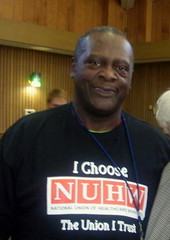My name is Tyrone Dickens and I am a union healthcare worker.
I have worked as a homecare provider in San Francisco for almost six years. My work involves cleaning, cooking and caring for patients in their homes who cannot do these things for themselves. For some of my homecare consumers who don’t have family any more, I am the only companion in their lives.
This week I have attended a civil lawsuit in which the officials of the union that currently represent me are suing the former leaders of my local union, leaders that I elected and that I still support. I know that may sound confusing, but I think I can explain it clearly so that you can understand.
 Despite my and other members’ protests, officials from SEIU removed the former leaders of my union, SEIU-UHW, from office in January of 2009 and since that time have pursued a civil lawsuit against 28 defendants who used to work for SEIU-UHW asking for $25 million. You can read more about the lawsuit and the defendants here.
Despite my and other members’ protests, officials from SEIU removed the former leaders of my union, SEIU-UHW, from office in January of 2009 and since that time have pursued a civil lawsuit against 28 defendants who used to work for SEIU-UHW asking for $25 million. You can read more about the lawsuit and the defendants here.
Like thousands of other healthcare workers in California, I support the former leaders of my union and the new union we are building together, the National Union of Healthcare Workers (NUHW). NUHW is a democratic union that we, the union members control.
That principle, workers having a democratic voice in our own union, has always been the primary disagreement between the officials of the SEIU and tens of thousands of healthcare workers and the leaders we have elected to represent us.
For that reason, I want the public to understand some facts about this lawsuit. This is a civil lawsuit. For as much as SEIU wants to make this trial seem like a criminal proceeding. It is not.
Despite SEIU making claims to my co-workers that this civil trial is the result of the defendants “stealing” money or that actions taken by the defendants hurt union members bargaining or grievances, the truth is that SEIU’s lawyers, some of the highest-powered attorneys in the country, are not making those claims at all.
However, SEIU is not explaining that to my coworkers.
SEIU is also not telling my coworkers that the scope of their civil lawsuit has shrunk. In fact, Judge Alsup, the federal judge overseeing this trial, reduced the scope of the trial to one fifth of SEIU’s previous charges. Even then, SEIU will have to prove its case in court.
What I’ve seen so far has not impressed me. Today we found out that SEIU staff who took over our union and who were supposed to be looking for and securing files didn’t do a very good job. The people who are saying that stuff is missing didn’t even try to see if someone else had them. They just said “Oh, well” and let it go.
One of the other things that I have learned about this trial that disturbs me is that the lawyers for SEIU are being paid an estimated three times more than what the civil suit is asking for. Since SEIU’s lawyers are being paid out of my dues money, I think our dues could have been better used fighting Arnold Schwarzenegger and protecting healthcare workers.
Finally, I would also like to share my personal experience of the civil trial. I attended the trial because I wanted information and to see for myself what was being said in court. Sitting alongside me in support of the defendants this week were other homecare workers, nursing home workers, hospital workers, community members, labor allies and friends and family. But don’t take my word for it, come to court and find out for yourself.
Thank you for reading,
Tyrone Dickens, IHSS, San Francisco
::
{NUHW, the National Union of Healthcare Workers, is a vibrant and democratic movement of healthcare workers, dedicated to dignity, justice, and healthcare for all. NUHW Voice features blog posts by workers from NUHW’s Our Voices page. You can follow NUHW on Facebook and Twitter.}
